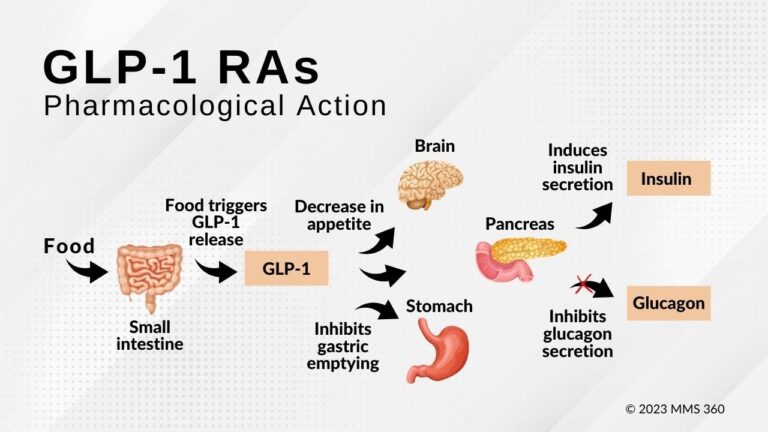HOW DOES SEMAGLUTIDE WORK?
Semaglutide has rapidly become a leading solution in the field of weight management and obesity treatment, challenging conventional weight loss strategies. Originally designed for diabetes management, Semaglutide has demonstrated remarkable efficacy as a weight control medication, while continuing to be an integral component in diabetes care. Its success in aiding individuals nationwide to reach their weight goals has sparked a growing curiosity about the mechanisms through which it facilitates weight loss.

Semaglutide, as a GLP-1 receptor agonist, has specific effects on various organs, including the small intestine, stomach, pancreas, and brain. Here’s a detailed look at how it works on each of these organs:
Small Intestine:
- Incretin Effect: Semaglutide enhances the incretin effect, which involves the release of hormones in response to food intake. In the small intestine, it increases the secretion of incretin hormones (like GLP-1) in response to nutrient ingestion.
- Nutrient Absorption: By enhancing the incretin effect, semaglutide may indirectly influence how nutrients are absorbed in the small intestine, although its primary effect is more related to hormone secretion than direct absorption processes.
Stomach:
- Gastric Emptying: Semaglutide slows gastric emptying, meaning the process by which food moves from the stomach to the small intestine is delayed. This contributes to prolonged feelings of fullness and can help reduce overall food intake, aiding in weight loss or management in obesity treatment.
- Appetite Regulation: The delay in gastric emptying also has an impact on appetite signals, which are partly regulated by how quickly the stomach empties its contents.
Pancreas:
- Insulin Secretion: Semaglutide stimulates the beta cells in the pancreas to produce more insulin in response to high blood glucose levels. This helps in reducing the blood sugar levels in diabetes patients.
- Glucagon Suppression: It also inhibits the alpha cells in the pancreas from secreting glucagon when blood sugar levels are low. Since glucagon typically increases blood sugar levels, its suppression by semaglutide helps in maintaining a more stable blood glucose level.
Brain:
- Appetite Control: Semaglutide affects the brain’s appetite centers, leading to reduced hunger and calorie intake. This action is beneficial for weight management in obesity.
- Satiety Signals: It enhances satiety signals in the brain, contributing to the feeling of fullness and aiding in controlling portion sizes and reducing overall food intake.

